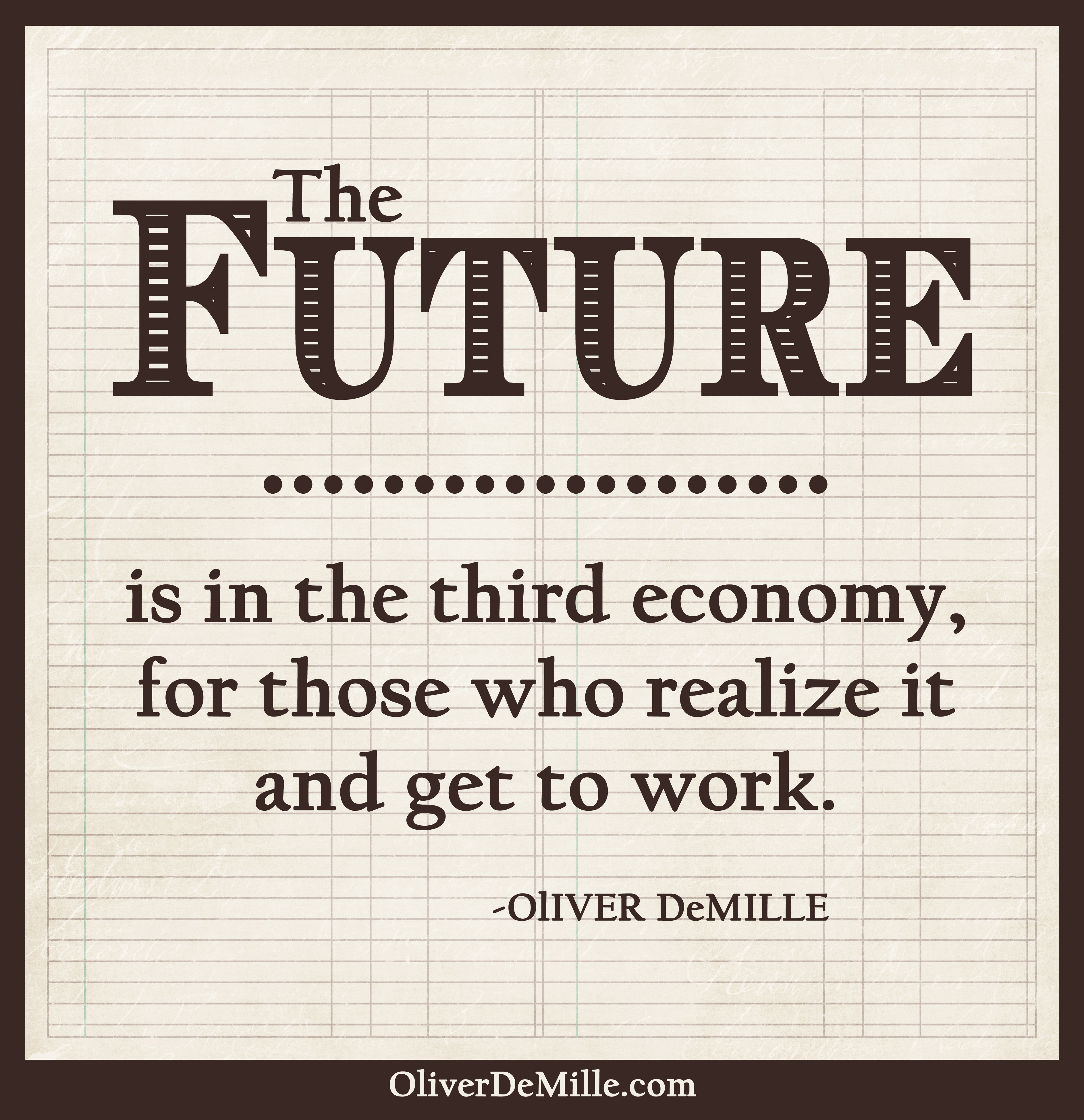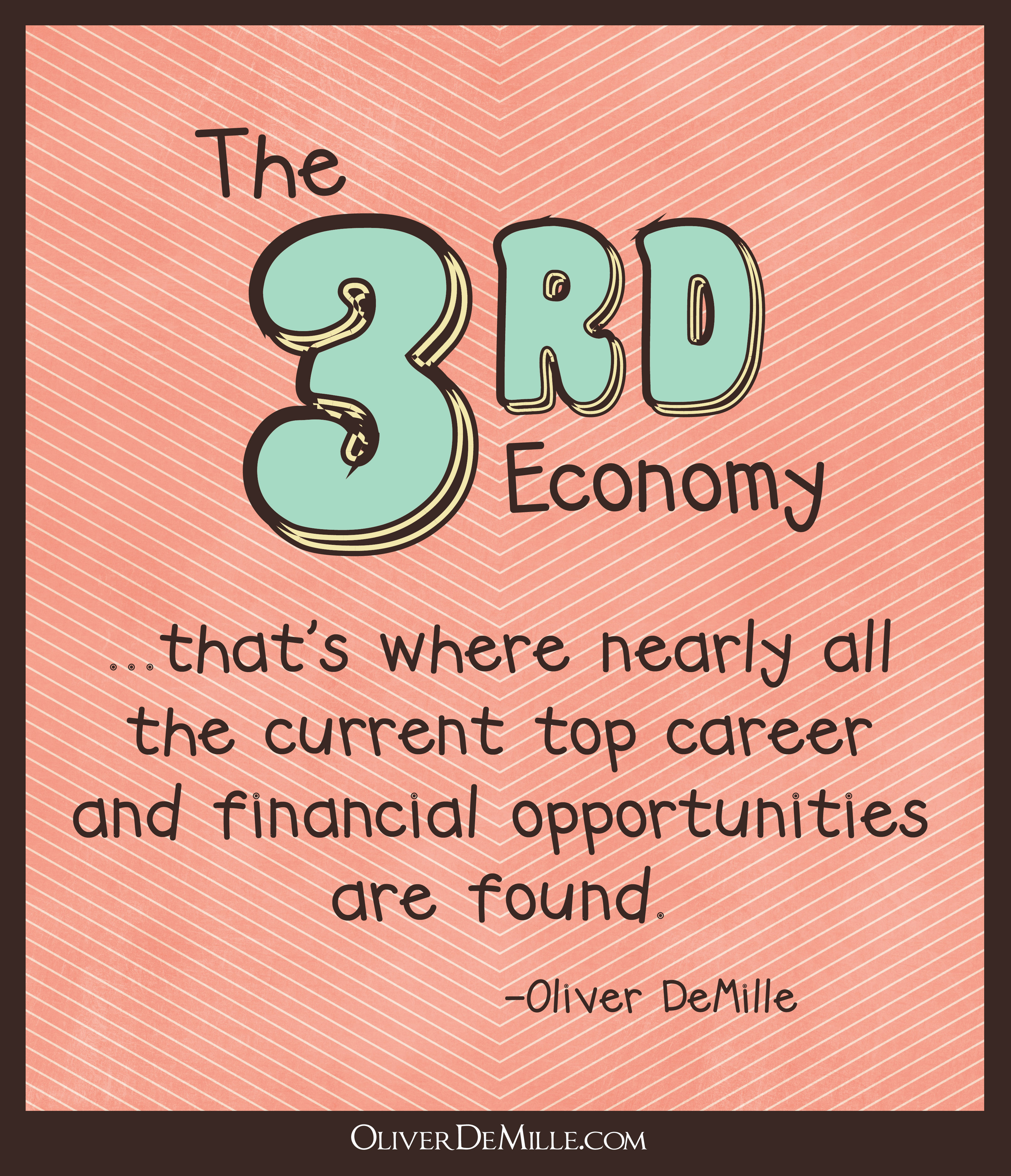The Divide
A college-level education is increasingly important in the new economy. Higher education has long created a significant divide between the “haves” and “have nots,” and by all indications this trend will intensify for the next three decades.
 The gap between the affluent (we’ll call this the A Economy) and the middle class (the M Economy) is growing, and higher education is one of the clearest differences between these groups.
The gap between the affluent (we’ll call this the A Economy) and the middle class (the M Economy) is growing, and higher education is one of the clearest differences between these groups.
The ranks of the lower classes (the R Economy—with R standing for “Risk”) are swelling, as more in the middle class find themselves caught in high debt and paycheck-to-paycheck living. Again, higher education marks the divide between those in the A Economy and almost everyone else.
Moreover, as North Americans compete for well-paying jobs and economic success in an increasingly global marketplace, the old system of “college degree = secure job with good benefits” no longer holds. Fewer graduates are able to maintain their parents’ lifestyle, and the middle class is dwindling.
As a result, those in the Middle Economy are left with a choice: rise to the Affluent Economy or join the Risk Economy. With career opportunities increasingly elusive for young people in this environment (in both North America and Europe), higher education has become even more important.
Where the Growth Is
This shift has also altered a few significant details of what makes a quality education—and what doesn’t.
For example:
- In many career fields, a four-year degree isn’t enough any more to distinguish a person from other job applicants. A graduate degree, or equivalent real-life success in business, the arts, or whatever field you want to work in, is needed.
- The largest growth sector now—and for at least two decades ahead—is entrepreneurship and small-to-medium size business ownership. Indeed, such businesses account for 80% of economic growth in free nations. Success in this field is highly demanding, and few schools adequately prepare students for it.
Most universities need to catch up with the realities of the new economy and offer truly effective entrepreneurial programs. Until they do, students who want to avoid the Risk Economy need to supplement their college studies with additional education. [I wrote an entire book on how to accomplish this: See 19 Apps: Leadership Education for College Students]
Read 19 Apps before or during college. Refer to it often, in addition to your traditional studies. Or, of you are already past college, read it now and add the supplemental skills and knowledge. This will greatly improve your effectiveness in the A Economy.
- Being well trained or well credentialed for a job is no longer enough. Those who flourish in the new A Economy need to be highly educated as well, in the broad and deep sense of getting a truly great education—not just shallow “general ed” classes and a basic career major.
 Specifically: success in this economy now depends on a number of vital skills that haven’t been emphasized in most colleges for over five decades, including initiative, innovation, ingenuity, out-of-the-box creativity, agility in the workplace, and the ability to turn book or media learning into real-world application—quickly and effectively.
Specifically: success in this economy now depends on a number of vital skills that haven’t been emphasized in most colleges for over five decades, including initiative, innovation, ingenuity, out-of-the-box creativity, agility in the workplace, and the ability to turn book or media learning into real-world application—quickly and effectively.
Paths
Other skills that have typically been part of college are still necessary as well, such as tenacity, teamwork, hard study, seminal knowledge in your career field, the ability to learn new things quickly, and “stick-to-it-iveness.”
- Thinking outside the box, and applying this in effective ways that make a difference in your daily work, are essential to success in the A Economy. Yet these skills are missing in many college programs. Sadly, the nationalized test emphasis of mainstream education often dis-incentivizes them. Interestingly, however, these skills are quite prevalent in many graduate and professional schools, from Law and Medical schools to equivalent programs in other fields, including some on-the-job leadership paths and various internship opportunities.
In this environment, what options do young people (and their parents) have? Few desire to enter the Risk Economy, and the Middle Economy is quickly shrinking. But how can you thrive in the Affluent Economy? The answers are quite enlightening.
Here are some of the options:
- Youth already in the Risk Economy can boost their prospects by traditional college. In the new economy, college is the new high school. Not punching this ticket can be a real problem for people stuck in the R Economy. (In addition, also ponder the advice below.)
- Those in the Middle Economy have a choice to make: join the Affluent Economy, or fall into the Risk Economy.
This is a big deal.
And your choices will directly determine where you land.
Note that many graduates find themselves with a college degree but without Economy A skills and knowledge, and most of them increasingly find themselves in debt and struggling to make ends meet (as an unwitting part of the R Economy).
How to Get There
The education is the thing, not the training, because quality Economy A education includes both the knowledge and skills that are essential for success in the new economy. With such education and skills, training (and re-training, for whatever and whenever it is needed) is easy.
Now, let’s get specific. There are at least three ways to get an excellent Economy A education:
- Study hard in college, then go beyond four-year college and get a quality professional education as well. Then—and this is the key—add Economy A skills in a post-school internship (such as clerkships for law school grads or interning after medical school).
- Attend college, study hard and do well, and simultaneously apply the kinds of Economy A supplemental study and skills acquisition covered in the book 19 Apps. Doing the 19 recommendations in this little book will very effectively upgrade your college training to top Economy A preparation.
- Work directly with a mentor or in an internship-based program that offers the same (or higher) level of education as a traditional university and also delivers the Economy A skills, knowledge, and lessons. Or do an entrepreneurial apprenticeship with a proven entrepreneurial leader and simultaneously get an Economy A education using the 19 Apps or equivalent. With the right mentor(s) or program, this can be incredibly effective. It’s worth mentioning that this is the type of education that universities used to offer before they adopted a mass factory model.
Level by Level
In our modern world, all three of these paths are viable options for real success in the A Economy. What won’t bring success is ignoring the importance of college-level and graduate-level learning. In the new economy, get as much education as you can, not just job or career training, but first-rate higher education in one of the three ways listed above—or something equivalent in Economy A quality.
Learn the Economy A skills and knowledge, or you simply won’t thrive in the A Economy.
This is real.
And it is vitally important for every family.
In TJEd we affirm that college-level and graduate-level education are simply essential for most young people today, and they are becoming more crucial every year. But it’s important not to just assume that enrollment in a good school is enough—to really get the skills and learning necessary to effectively compete and flourish in the global economy, and the A Economy, you’ve got to get a truly superb higher education.
Start with an excellent Core, Love of Learning, and Scholar Phase, and then take it to the next level with the highest quality higher education.
There is more than one way to do this, as outlined above, but it is essential for most members of the rising generations.
(To download the ebook 19 Apps: Leadership Education for College Students)


































Check out BYU-I Pathway program. It is a fantastic opportunity, especially for the R’s.
I was trying to figure out if I wanted to continue going to college and this article popped up under another Google search that I did. What do you suggest for homeschooling moms that are returning to college?
Yeah, this is spot on. Maybe I’ll have our students read this post in our College Leadership course at Williamsburg Academy. It aligns very well to our own perspective, and to the messaging we are sending our students about the role of college in the new economy. Great post. Thanks!
If much if growth is entrepreneurial, then perhaps all that school is not necessarily the best use of time or funds. The reason more folks need to go to school longer is because more people are walking around with Bachelors degrees and post-graduate degrees are now used to “stand out”. Just a thought.